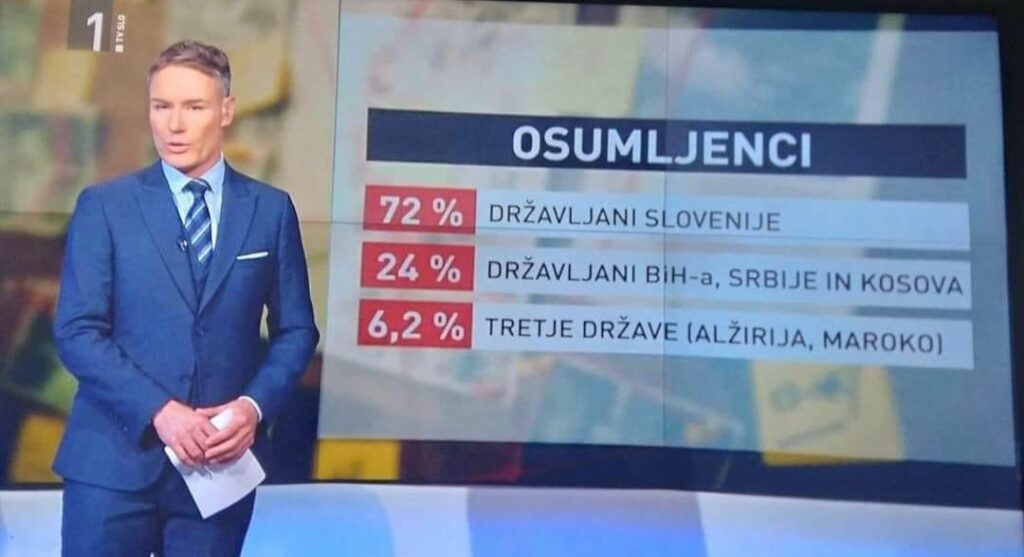The national media outlet Radio-Television Slovenia (RTVS) has finally spoken out about the rise in rapes in Slovenia. In the last year, we saw that these stories only rarely found their way to the public. Why? Illegal migrants have been among the suspects. When the “depoliticised” establishment finally addressed the worrying trend, it tried to relativise the rapes committed by illegal migrants in the last year. What is more, the journalists who prepared the piece seem to have a problem with counting to 100 and the concept of “third countries”.
The article recently published on Television Slovenia has been widely condemned by the public. For example, the President of the Slovenian Democratic Party (Slovenska demokratska stranka – SDS), Janez Janša, wrote: “On the liberated RTV Slovenia, mathematics is also Free. The total percentage sum can be 102 percent.” Former minister Matej Lahovnik also commented on the data and the police statements on which the RTV report was based: “I would like to ask the police officer who tried to “comfort” people with the fact that there are more Slovenian citizens than migrants among the rape suspects to revise the basics of the statistics on structural proportions – because he or she is coming off as a very stupid, petty politically motivated person.”
The first thing the viewers noticed was that RTV clearly struggles to count to 100. When they wanted to show, in percentages, what percentage of rapes are committed by individuals, broken down by nationality, they clearly miscalculated the percentages. The total sum of their breakdown – namely, that 72 percent of rapes are committed by citizens of Slovenia, 24 percent by citizens of Bosnia and Herzegovina, Serbia and Kosovo, and only 6.2 percent by citizens of third countries (Algeria, Morocco), comes to 102.2 percent.
But above all, this type of calculation omits an essential element, namely – the number of persons of each nationality residing in Slovenia. As a result, such calculations also lead to distorted conclusions.
To illustrate, according to the latest data from the Statistical Office of the Republic of Slovenia, there are currently 2,120,937 people living in Slovenia. 1,923,879 of these people have Slovenian citizenship. 197,058 are foreign citizens. 9.3 percent of residents of Slovenia are foreign nationals.
In 2023, 32 crimes of rape and sexual violence have been recorded in the Ljubljana municipality alone. Of these, 22 suspects are citizens of Slovenia, 4 suspects come from Bosnia and Herzegovina, Serbia or Kosovo, and 6 suspects come from countries such as Algeria and Morocco, meaning that they are most likely illegal migrants. A breakdown of the number of rapes by nationality is published below.
| 2017 | 2018 | 2019 | 2020 | 2021 | 2022 | 2023 | |
| Citizenship | Number of suspects | Number of suspects | Number of suspects | Number of suspects | Number of suspects | Number of suspects | Number of suspects |
| The Republic of Slovenia | 7 | 4 | 4 | 1 | 4 | 10 | 11 |
| Third Countries | 1 | 5 | 2 | 2 | 3 | 7 | |
| Countries of the European Union | 1 | ||||||
| Total | 8 | 5 | 9 | 3 | 6 | 13 | 18 |
In the year 2023, so far, 18 people have been suspected of rape in Slovenia. There were 11 suspected rapists of Slovenian nationality and 7 suspected rapists from third-country nations. No European Union nationals have been suspected of rape in Slovenia this year.
Claims that Slovenian citizens have to fear their fellow citizens above all are therefore distorted and disingenuous. Let us just look at the proportions. There are 941,502 male Slovenian citizens living in Slovenia. 11 of them are suspected of rape. There are 125,132 male foreigners living in Slovenia. 7 of them are suspected of rape. The data clearly show that the probability of a foreign national committing rape is higher than the probability of a Slovenian national committing rape.
Up-to-date data on the number of individual nationals on Slovenian soil on any given day is difficult to obtain. Data from the Statistical Office define a resident as someone who has a permanent or temporary residence in Slovenia. Nevertheless, the data reveal why the police data and its distorted presentation by the national media outlet RTV do not tell the whole picture.
What is a “third country”?
However, the “depoliticised RTV” also seems to have a serious problem with legal terms. In a misleading graphic illustration, they show Bosnia and Herzegovina, Serbia and Kosovo citizens separately from all other “third countries”. The definition of a “third country” is defined in the Foreigners Act, Article 2, as follows: “A third country is any country which is not a member of the European Union.”
Ž. K.


